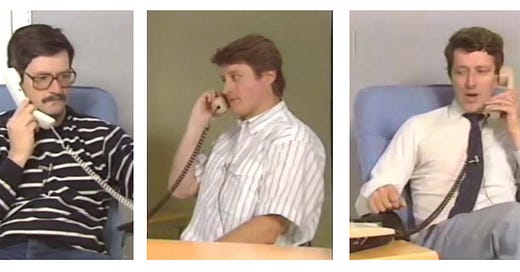In 2019 or 2020, I started to extract all Joe Armstrong from his publications and conferences. It started as a small project on Wikiquote. If you are interested, please help me! If you want to help me, you can also subscribe to this blog, you will receive more quotes from Joe Armstrong and others!
26 Years with Erlang
26 Years with Erlang, July 13, 2013
I thing the first company that's a pure Erlang worth a billion dollars.
I was programming Prolog [...] What happens when a Prolog program goes wrong? it says no. There "no" is not a very good error. Core damage is much more informative for no.
One thing I wanted to do with Prolog, pick some sort of better things. Better stuff should happen when it fails. The other problem with prolog is that you could only do one thing, and you can only have one process. So I wanted and I thought Prolog was really great. I made an algebra to describe telephony in Prolog but the only trouble was you could only describe one process and if they didn't do what you'd expected them to do when you got failure, it didn't work.
The spec does not tell me what to do. What do I program? [...] I thought this is crazy, we are building products with specifications and things, and the specifications doesn't say what's supposed to happen. Then when you get to this point in the code where you don't know what's going to happen, everybody knows how programs it. I thought that's crazy because I didn't know and I thought everybody could interpret that differently and they could make an ad-hoc decision. So I thought to myself, the only sensible thing to do is crash. We just crash this call because we don't know what to do.
In a file system, if a program opens a file and does something and then crashes, the operating system closes the file for you. It's not still open and then you can use it again. So I thought to myself, well, a call is like a file. So, what happens if you do this hook, you crash the program. Somebody else will watch (the operating system) will watch) and it will close the call just like closing a file. That was the origin of this thing that's now I call Let It Crash.
This was actually fast to build the prototypes of the telephony system but they were running very slowly. at that stage we said: let's make a product out of this. We thought the semantics were okay but the performance wasn't.
I think things like PowerPoint have sort of destroyed creativity.
I will never ever make any statement about performance that is not based on measurement and I will never ever advise anybody on how to write their code without saying write it and measure. I just will not speculate. I think people who do speculate about this should not speculate about it and they should write it, run it and measure it.
I am the world's worst C programmer because it's so complicated I can't understand it [...] All I know is that whenever I write C, my pointers are always missed by one from where they're supposed to go.
You're a programmer, you've just written 100 lines of codes that C++ programmers have failed to do. You want to show it to people because you're quite pleased. You think they're going to be pleased...




